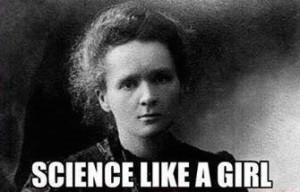 With Adam at the helm this week, we kick off with a segment from Cristina highlighting the challenges women face forging a path in Science-related fields, we feature part 2 of our interview with guest Brian Tomasik about Wild Animal Suffering and finally, Adam sheds some light on why our veins look blue.
With Adam at the helm this week, we kick off with a segment from Cristina highlighting the challenges women face forging a path in Science-related fields, we feature part 2 of our interview with guest Brian Tomasik about Wild Animal Suffering and finally, Adam sheds some light on why our veins look blue.
Download direct: mp3 file
If you like the show, please leave us a review on iTunes!
SHOW NOTES
Women In Science
Eight Inventions By Women That Men Got Credit For
National Geographic: Women Scientists Overlooked
Mental Floss: 19 Things You Might Not Know Were Invented By Women
Top 10 Things That Women Invented
Huff Post: Billy Nye Interview
Women Inventors: Margaret Knight
Chien-Shiung Wu Overlooked for Nobel Prize
Women Who’ve Won Science Nobel Prizes
Huff Post: Women Nobel Prize Winners in Science
NY Times: Why So Few Women In Science
Blue Blood
The Straight Dope: If blood is red why do your veins look blue?
Why do veins look blue? – Dr. Karl’s Great Moments in Science (ABC Science)
Why do veins appear blue? A new look at an old question








Cristina asked Adam at 47:45 why royalty had sometimes been described as blue blooded.
According to WikiPedia its use in English is from a Spanish phrase that was used to describe the light skinned nobles; those people who hardly did labor and whose blue veins could be seen through their hands.
Good episode. While it was interesting and eloquently expressed, I found Mr Tomasik’s thesis to be fundamentally flawed and rather absurd. Particularly appalling to me is the implication that not existing is preferable to existing with manageable suffering. The simplest way to end suffering would be mass-extermination of all life, and that is the requisite extension of the idea that seeding new planets is bad. Problem solved.
This is my interpretation of his case, boiled down:
– Premise 1: human suffering is inherently bad.
– Premise 2: animals are just as worthy of concern as humans.
– Conclusion: animal suffering should be avoided.
The problem, for me, is that I disagree with not one but *both* of those premises. What is suffering? It is a neurological response to stimuli which can inform our bodies of potential hazards or damage. Why is that bad? I heard no convincing case that suffering is inherently bad.
Why do humans care about each other? Why *should* humans care about each other? Is there some objective imperative that we should prevent suffering in each other? No. Avoiding suffering is part of a malleable social contract that we are born into as part of most societies. It improves my life, and it improves the success of our species. Likewise, animal suffering is only important so far as it improves the success of our species. Is that anthropocentric? Definitely. I heard no convincing case against anthropocentrism.
I thought it was a little odd that he would publish under the title “utilitarian,” because I found this highly non-utilitarian. I also found it odd that he would relate this to vegetarianism. I’m a vegetarian, and have been for more than 20 years. I’m vegetarian for purely utilitarian reasons: efficiency, health, environment, social justice, etc. The animals themselves matter little to me.
One final note: the reason that apex predators are important is because they keep other species in check. National and State Forests here in Pennsylvania are in trouble, because the deer are so rampant that the saplings of many native tree can’t get started. This results in less biodiversity and weakened ecosystem. Since humans are wholly dependent on ecosystems, that’s a HUGE deal.
Isaac,
“What is suffering? It is a neurological response to stimuli which can inform our bodies of potential hazards or damage. Why is that bad? I heard no convincing case that suffering is inherently bad.”
What is bad is not the function of pain – to avoid injuring ourselves -, but rather the raw feel we experience when in pain. It’s the conscious experience we are referring to when we talk about suffering.
As people with congenital insensitivity to pain show, being aware of bodily damage and potential hazards is very important. If the function of pain could be implemented another way, allowing us to attend to our injuries and infections when they occur without the undesirable raw feelings of pain, then I think, clearly, this would be better than our current system of pain.
When pain doesn’t help us prevent or become aware of injuries or infections etc, then again, I think, clearly, to experience that pain is bad. To have chronic pain or undergo surgery without an anaesthetic are bad things; suffering is bad.
“Avoiding suffering is part of a malleable social contract that we are born into as part of most societies. It improves my life, and it improves the success of our species. Likewise, animal suffering is only important so far as it improves the success of our species.”
What do you mean by it improves your life? As in it improves your subjective experiences, allows you to avoid painful experiences etc?
No doubt, empathy and altruism exist because they improved the success of our [ancestor’s] species, but I don’t think that’s why they are important to us, morally. I think they’re important because they improve the lives of us humans and other animals.
“I thought it was a little odd that he would publish under the title “utilitarian,” because I found this highly non-utilitarian. […] The animals themselves matter little to me.”
Fair enough. Personally I find Brian’s arguments highly utilitarian. When I think of utilitarianism I immediately think of Jeremy Bentham and his greatest happiness principle.
We value different things, it seems. You value, I gather, the success of Homo sapiens and I value positive conscious experiences like pleasure and disvalue negative experiences like pain.
I’m curious to know what you think of my comments. Hopefully I didn’t misrepresent any of your positions or arguments.
Cheers
Hey guys, Josh here again.
For the case that have changed since last time I’m a mathematician and listened with interest to the first story. However I don’t agree Ada Lovelace invented the first algorithm (I hope I’m remembering the claim correctly).
To a mathematician an algorithm is a method described using a well-defined formal language for solving a problem. Having hardware to run it on isn’t an important part of the definition. As such algorithms have existed for centuries (wikipedia backs me up on this. :P)
We get the word algorithm itself from the name of al-Khwārizmī, A Persion mathematician who lived between 780 and 850 A.D. (as an aside from a book he wrote, *al-Kitāb al-mukhtaṣar fī ḥisāb al-jabr wal-muqābala* “The Compendious Book on Calculation by Completion and Balancing” we also get the word algebra (from al-jabr)).
And going even further back than that medieval Indian mathematical works consisted of sutras, which were a set of rules laid in a way to help students memorise them followed by prose commentary. Almost like mathematical mantras if you like. 😛
If you wanted to credit Ada Lovelace with something you could probably say she was the first person to construct an algorithm specifically to be run on a computer. But yeah, really not the inventor of algorithms as a concept.
On the subject of the history of maths there’s an excellent book called ‘The History of Mathematics’ by Victor Katz. However be warned it’s written for mathematicians so it would be hard going for a layman.
Finally, I have to say regarding the first outtake at the end with regards to the porn star and ‘two steps forward and one step back’… I mean, yeah, do you know anything about her other than that she’s a porn star? Because this *looks* a lot like slut shaming and as such I found it pretty disappointing. Your show is really good and it doesn’t need that sort of thing bringing it down.
Hi Josh. I expect Cristina will comment on your main points since it was her segment. As for the out-take, I could try to defend it by suggesting that those silly snippets at the end are always supposed to be funny and never have any context. I could also suggest that: “2 steps forward, 1 step back” could easily have been a comment about the podcast: i.e. we take 2 steps forward by discussing an important issue and 1 step back with an unrelated aside about a porn star who just happens to have the same surname. Instead, I’ll just say you are right that it had no place on the show. I, as the editor, will try to do better in the future.
Hey Josh!
Thanks for your detailed note and the interesting historical info! (The al-jabr fact was especially cool to learn.) Good ear! You did remember correctly. One of the articles that I cull from for the Lovelace excerpt states, “The notes are considered the first descriptions of what we now call algorithms and computer programming…” So to your point above, it is more accurate to say she is considered to be “the first person to construct an algorithm specifically to be run on a computer” so as not to make it sound like she actually invented them.
PS. As for Lovelace, I am very aware of her backstory. The comment had nothing to do with her personally. Cheers!
Argh! For the *cast* that have changed. Probably other typos there too. Where’s an edit button when you need it!
I have to comment on the wild animal suffering piece. It seems like the logical, though absurd, conclusion is that the instant we determine a species can suffer we should, humanely, wipe it out. By the standards set forth in the piece it seems like the only option. If we can grant them a swift painless death we avoid all the suffering they will inevitably endure. In fact all sentient life suffers so I propose we immediately develope some sort of doomsday weapon which will instantly destroy all sentient life on earth, it’s the only ethical option.
Thanks to previous commenters for good comments on the animal suffering segment.
I thought it was interesting and useful as a thought experiment. But the reasoning is so full of flaws and logical fallacies that it could also serve as an example in argumentation analysis.
The whole piece revolves around being able to summarize the suffering of an over a lifetime and give it a single meaningful number. That assumption is by no means self evident.
Near the end we learn about learned helplessness: people with other opinions are using false arguments and excuses to avoid the conclusions. This protects them from ethical dilemmas. If they also fail to change their mind when they learn about “the facts”, that is because they keep protecting themselves by not being fully rational.
Maybe I misunderstand his argument, but saying that your opposition simply have not understood the true facts is not very skeptical and open minded to me. Also I find that he misrepresents and simplifies the reasoning of others to better suit his own arguments.
Name that fallacy!